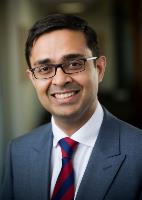 Year of qualification
Year of qualification
2003
Current Position
CRUK Clinician Scientist, University of Cambridge & Honorary Consultant, Department of Plastic & Reconstructive Surgery
Alma Mater and career to date
2003 MBBS Christian Medical College & Hospital in Vellore (India)
2013 PhD Cambridge University; Supervisor Prof Phil H Jones
“Stochasticity & order: studies of keratinocyte proliferation”
2016 FRCS Plastic Surgery
2017 Poche Fellow Melanoma & Surgical Oncology (Melanoma Institute Australia, Sydney)
2017 Hunterian Professorship Royal College of Surgeons of England
2019 CRUK Clinician Scientist & Honorary Consultant
When did you decide to get involved in research and why?
As a medical student, I was fortunate to meet Dr Paul Brand, the renowned leprosy hand surgeon and author of Clinical Mechanics of the Hand. His meticulous approach to surgical clinical research working with patients with hand deformities left a significant impression on me at an early age. The ability to use observation and foresight to answer surgically relevant questions has remained with me. I have continued to be inspired by clinical and scientific mentors who have encouraged me with my endeavours.
What is your area of interest?
I have interests in surgical oncology, melanoma, keratinocyte stem cell biology & translational surgery. I enjoy exploring translational aspects of basic science to clinical surgery and asking fundamental mechanistic questions about surgical oncology. The main thrust of my current research work is in elucidating the role of circulating tumour DNA in early stage melanoma.
How have you managed to combine clinical work with research?
This is always difficult in craft based specialties where clinical time competes with research time. I have tried my best to keep my clinical interests and research interests aligned, and therefore using time synergistically. Through my training, I have found blocks of time spent in research and clinics seems to be most effective for my working style, although this will be different for different people.
What have been the sources of your research funding?
Rosetrees Trust & Royal College of Surgeons of England Surgical Research Fellowship (2009)
CRUK-Cambridge Cancer Centre Clinical Research Fellowship (2010-2013)
CRUK Clinician Scientist Award (2019-2024)
What are the benefits and challenges of being a clinical academic?
Combining clinical surgery with academic work comes with a unique set of challenges, but has great potential benefits. Being a clinical academic gives the opportunity to look at biological questions from a different angle, and often suggest immensely practical solutions. On the flip side, trying to run an operating theatre, a clinical service and a research program at the same time requires discipline if it is not to displace time with family.
Selected Publications
Roshan A, Murai K, Fowler J, Simons BD, Nikolaidou-Neokosmidou V, Jones PH. Human keratinocytes have two interconvertible modes of proliferation. Nature Cell Biology (2016) 18:145-156
Martincorena I, Roshan A, Gerstung M, Ellis P, Van Loo P, McLaren S, Wedge DC, Fullam A, Alexandrov LB, Tubio JM, Stebbings L, Menzies A, Widaa S, Stratton MR, Jones PH*, Campbell PJ*. High mutational burden and pervasive positive selection of somatic mutations in normal human skin. Science (2015) 348:880-886
Roshan A, Jones PH, Greenman CD. Exact, time-independent estimation of clone size distributions in normal and mutated cells. J Roy Soc Interface (2014) 11:20140654
Doupé DP*, Alcolea MP*, Roshan A, Zhang G, Klein AM, Simons BD, Jones PH. A single progenitor population switches behavior to maintain and repair esophageal epithelium. Science (2012) 337:1091-3
Enoch S*, Roshan A*, Shah M. Emergency and early management of burns and scalds. Brit Med J (2009) 338:b1037
(*equal contribution)